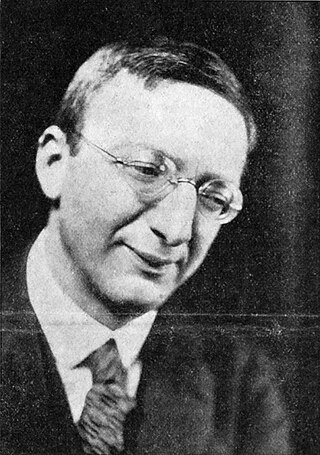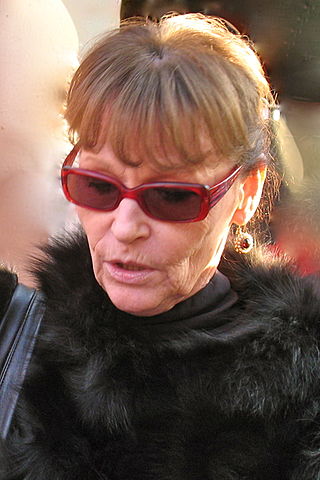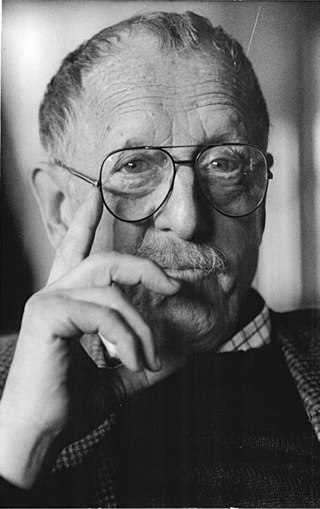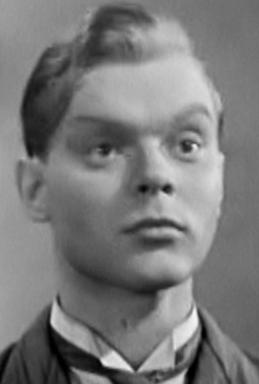Related Research Articles

Alexanderplatz is a large public square and transport hub in the central Mitte district of Berlin. The square is named after the Russian Tsar Alexander I, which also denotes the larger neighbourhood stretching from Mollstraße in the north-east to Spandauer Straße and the Rotes Rathaus in the south-west.

Armin Mueller-Stahl is a retired German actor who also appeared in numerous English-language films since the 1980s. He was nominated for the Academy Award for Best Supporting Actor for his role in Shine. In 2011, he was awarded the Honorary Golden Bear.

Bruno Alfred Döblin was a German novelist, essayist, and doctor, best known for his novel Berlin Alexanderplatz (1929). A prolific writer whose œuvre spans more than half a century and a wide variety of literary movements and styles, Döblin is one of the most important figures of German literary modernism. His complete works comprise over a dozen novels ranging in genre from historical novels to science fiction to novels about the modern metropolis; several dramas, radio plays, and screenplays; a true crime story; a travel account; two book-length philosophical treatises; scores of essays on politics, religion, art, and society; and numerous letters—his complete works, republished by Deutscher Taschenbuch Verlag and Fischer Verlag, span more than thirty volumes. His first published novel, Die drei Sprünge des Wang-lung, appeared in 1915 and his final novel, Hamlet oder Die lange Nacht nimmt ein Ende was published in 1956, one year before his death.

Berlin Alexanderplatz is a 1929 novel by Alfred Döblin. It is considered one of the most important and innovative works of the Weimar Republic. In a 2002 poll of 100 noted writers, the book was named among the top 100 books of all time.

The Marriage of Maria Braun is a 1978 West German drama film directed by Rainer Werner Fassbinder. The film stars Hanna Schygulla as Maria, whose marriage to the soldier Hermann remains unfulfilled due to World War II and his post-war imprisonment. Maria adapts to the realities of post-war Germany and becomes the wealthy mistress of an industrialist, all that while staying true to her love for Hermann.

Gottfried John was a German stage, screen, and voice actor. A long-time collaborator of Rainer Werner Fassbinder, John appeared in nine of the filmmaker's projects between 1975 and 1981, the year before Fassbinder's death, including Eight Hours Don't Make a Day, Mother Küsters Goes to Heaven, Despair, The Marriage of Maria Braun, and Berlin Alexanderplatz. His distinctive, gaunt appearance saw him frequently cast as villains, and he is best known to audiences for his role as the corrupt General Arkady Ourumov in the 1995 James Bond film GoldenEye, and for his comedic turn as Julius Caesar in Asterix & Obelix Take On Caesar, the latter for which he won the Bavarian Film Award for Best Supporting Actor.

Angelica Domröse is a German actress, who became famous in the role of Paula in Heiner Carow's film The Legend of Paul and Paula. Her biological father was a prisoner of war from France.

Erwin Geschonneck was a German actor. His biggest success occurred in the German Democratic Republic, where he was considered one of the most famous actors of the time.

Ben Becker is a German film, theatre and voice actor.
Karin Baal, real name Karin Blauermel, is a German film actress. She has appeared in more than 90 films since 1956.
Hans Paetsch was a German actor. He appeared in 52 films between 1939 and 2002. He is most notable for his voice acting, especially as a narrator of fairy tales and audio dramas.

Hans Richter was a German film actor. He appeared in more than 130 films between 1931 and 1984, mostly in supporting roles. He was born in Brandenburg, Germany and died in Heppenheim, Germany.

Mitte is a central section of Berlin, Germany, in the eponymous borough of Mitte. Until 2001, it was itself an autonomous district.

The Alexanderplatz demonstration was a demonstration for political reforms and against the government of the German Democratic Republic on Alexanderplatz in East Berlin on Saturday 4 November 1989. With between half a million and a million protesters it was one of the largest demonstrations in East German history[A] and a milestone of the peaceful revolution that led to the fall of the Berlin Wall and German reunification. The demonstration was organized by actors and employees of theaters in East Berlin. It was the first demonstration in East German history that was organized by private individuals and was permitted to take place by the authorities. The speakers during the demonstration were members of the opposition, representatives of the regime and artists, and included the dissidents Marianne Birthler and Jens Reich, the writer Stefan Heym, the actor Ulrich Mühe, the former head of the East German foreign intelligence service Markus Wolf and Politburo member Günter Schabowski.
Peter Märthesheimer was a German screenwriter, producer and author.

Berlin-Alexanderplatz or The Story of Franz Biberkopf is a 1931 German drama film directed by Phil Jutzi and starring Heinrich George, Maria Bard and Margarete Schlegel. It was adapted from the 1929 novel of the same title by Alfred Döblin, who also co-wrote the screenplay.
Albert Peter Adam Florath was a German stage and film actor.
Ernst Behmer was a prolific German stage and film actor who appeared in more than a hundred films during the silent and early sound eras.

CineStar is a cinema company based in Lübeck, Germany.
Josef Dahmen was a German stage, film and television actor.
References
- ↑ "The Lord of Alexanderplatz | DEFA Film Library". www.umass.edu. University of Massachusetts. Retrieved 9 December 2023.